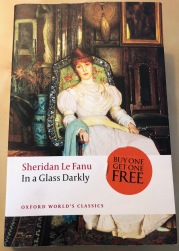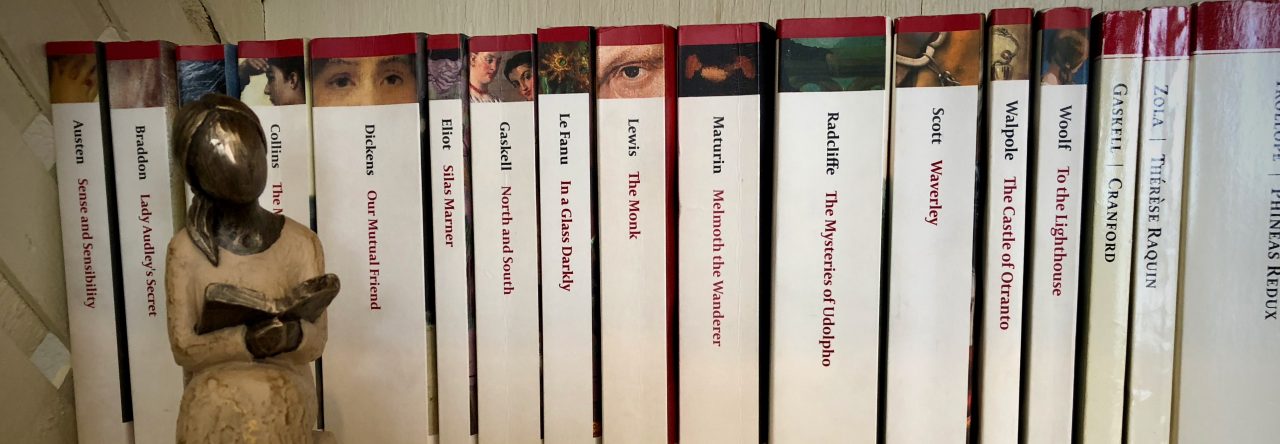My classics goals for this year have shifted a little bit. Instead of reading “a majority” of classics (which, let’s face it, would be more than 50, which seems a little unrealistic), my 2018 goals are:
- 1 classic a month
- 1 early modern book a month
(and also 1 adult contemporary book every 2 months, but that doesn’t count for this blog.) (unless, you know, future classics?)

The early modern reading goal arises from my newly minted grad school focus on the early modern period in England, and the knowledge that I need to get my read on. Early modern, for those who are wondering, is roughly the 1500s through about 1660. Shakespeare, John Donne, Christopher Marlowe, Sir Philip Sidney, Thomas More . . . those guys. I’m concentrating on Shakespeare at the moment because he’s the subject of my thesis, but I’m trying to expand.
SO, in the interest of accountability, here’s my January books. I did actually meet my goals this month, and even exceed them, although all the books I read were slim, quick reads. I think I read the Cather and Shakespeare each in two days.
Classics:
 In A Glass Darkly Sheridan Le Fanu
In A Glass Darkly Sheridan Le Fanu
I bought this book last summer in England, during my raid of the Oxford University Press bookstore. I love the Oxford Classics editions; they’re lovely, with that iconic red and white cover, inexpensive (relatively), and have great notes. The OUP bookstore (and Blackwell’s, one street over), usually have buy 1, get 1, or buy 2 get 1 deals, which is a great way to collect these books. I just have to limit myself, because, you know, they have to fit in my suitcase. Since I bought a bunch of them, and then proceeded to have a crazy fall and read exactly none, they’ll be frequent visitors this year.
I hope.
But you want me to tell you about the book, right? In a Glass Darkly is a collection of short stories published in 1872. They are framed as case files from the late Dr. Hessalius, a medical doctor with interests in psychological and (possibly) supernatural illness. Each story begins with the (unnamed) literary executor explaining where the story came from, giving each tale a “real world” anchor. There are five stories: the shorter “Green Tea,” “The Familiar” and “Mr. Justice Harbottle,” and the longer “The Room at the Dragon Volant” and “Carmilla.”
I began reading this book immediately, but put it down somewhere in the middle of “The Familiar” for several months. While I enjoyed all of the stories, I thought the first three were only okay. But the last two – OH BOY.
Le Fanu mostly writes Gothic fiction, and is a master at the “maybe it’s a ghost or maybe he’s hallucinating” kind of feint, an uncertainty which he makes plausible and not at all cheesy. “Dragon Volant” is a long story and took a little while to get into, but then I was so hooked. It is about an Englishman, Beckett, on tour in Europe and so ready for some kind of adventure, preferably one where he rescues a beautiful lady, and boy does he get what he wants. This turns out to be more like a mystery than a gothic or supernatural tale.
“Carmilla” is one of the first English vampire stories, and it’s a classic, and so well done, and that’s all I’m going to say because spoilers.
O Pioneers Willa Cather
 This book, published in 1913 and set in Nebraska around the turn of the last century (it’s not really specified), is about Alexandra Bergson, who emigrated from Sweden with her family a number of years before the story opens. Despite having two older brothers and a younger one, it is Alexandra, with a head for business and an intuitive feel for the land, who takes over the family farm after her father dies when she’s a teenager. The story follows Alexandra and her family and friends through the next twenty years as she prospers financially and yet still experiences deep suffering in other ways.
This book, published in 1913 and set in Nebraska around the turn of the last century (it’s not really specified), is about Alexandra Bergson, who emigrated from Sweden with her family a number of years before the story opens. Despite having two older brothers and a younger one, it is Alexandra, with a head for business and an intuitive feel for the land, who takes over the family farm after her father dies when she’s a teenager. The story follows Alexandra and her family and friends through the next twenty years as she prospers financially and yet still experiences deep suffering in other ways.
Personally, I think My Ántonia is a better book, with a stronger coherency, but this critique makes sense as O Pioneers is one of Cather’s first books. You can tell she’s still figuring some things out. In particular, the plot feels uncertain for about the first third of the book, like a collection of sketches instead of a novel. That does not mean this isn’t still a great book, and the plot coheres eventually. I love Cather’s prose so much, and the way she makes the land almost a character in the book is beautiful. For instance, the first sentence of the book: “One January day, thirty years ago, the little town of Hanover, anchored on a windy Nebraska tableland, was trying not to be blown away.”
If you like contemporary fiction, but find most classics a struggle to read, try O Pioneers; despite being a hundred years old, in many ways its writing feels very contemporary.
Early Modern Books:
The Winter’s Tale by William Shakespeare
 This play was first performed around 1611, late in Shakespeare’s career, and printed in 1623. It is about Leontes, the king of Sicily, who suddenly decides, for no good reason, that his best friend, the king of Bohemia, has been having an affair with Leontes’ wife Hermione. And Hermione is very pregnant. And Polixines, the friend, has been visiting for nine months. And they definitely (actually) did not have an affair.
This play was first performed around 1611, late in Shakespeare’s career, and printed in 1623. It is about Leontes, the king of Sicily, who suddenly decides, for no good reason, that his best friend, the king of Bohemia, has been having an affair with Leontes’ wife Hermione. And Hermione is very pregnant. And Polixines, the friend, has been visiting for nine months. And they definitely (actually) did not have an affair.
Confused? It’s not you. This play is weird, and convoluted, and I love it. The first three acts are kind of uncomfortable because of Leontes’ accusations, but this gives Hermione and one of her ladies, Paulina, the chance to be strong and awesome. Then the action jumps 16 years, and suddenly there’s a happy ending. Time shows up. Bohemia has a coast (it’s the (very landlocked) present-day Czech Republic). A guy is mauled by a bear (offstage). It’s so random, you just kind of have to go with it. Imagine it’s a fantasy, and it works much better.
Why do I like this play so much? I have no idea. Some of it is influenced by the Royal Ballet’s production, available on Amazon, which is so beautiful and which, stripped of the language, somehow helps the plot make sense. This is itself a little crazy, because the language in this play is amazing, too. I can’t quote my favorite line, because it’s a major spoiler, but here’s Paulina telling Leontes like it is: “I’ll not call you tyrant, / but this most cruel usage of your queen, / Not able to produce more accusation / Than your now weak-hinged fancy, something savors of tyranny” (2.3.115-119). Ouch.
So there you go. A lot of words about a few of the books I read in January. I’m quite pleased that I managed to meet, and even exceed, my new goals, although I know that may not last. I picked up Anna Karenina the other day, which is just . . . oh, boy. It’s so big. (I like it, but it’s so long). We’ll see how successful I am in February.
—-
Also, it occurred to me that I could have taken prettier pictures. Something to aspire to next month, because I’m not re-taking these.
